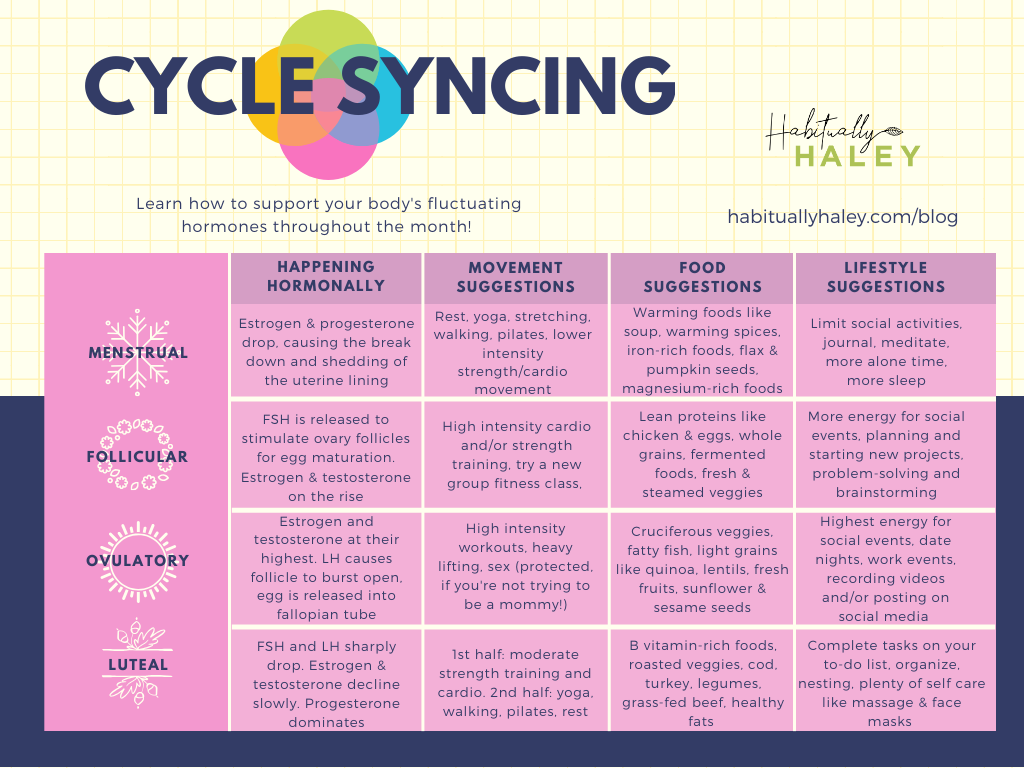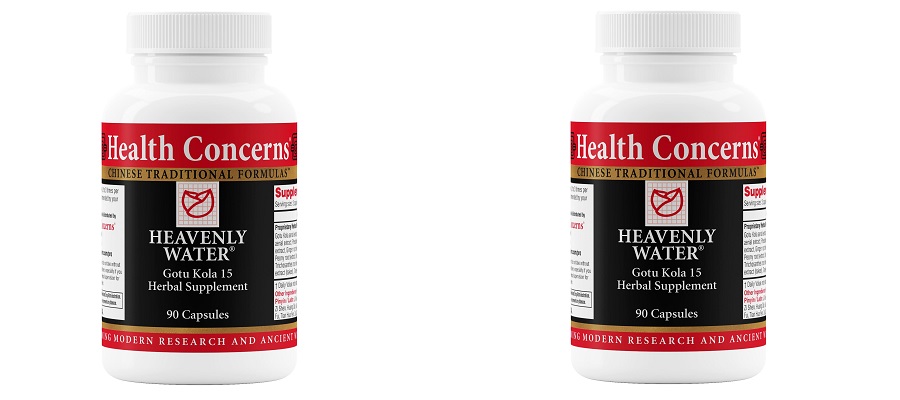Before we talk about supplements for cycle syncing, we want to educate you more on cycle syncing.
Cycle syncing is a holistic approach that involves aligning various aspects of your lifestyle with the different phases of your menstrual cycle. It recognizes that women's bodies undergo hormonal fluctuations throughout the menstrual cycle, and these changes can impact energy levels, mood, productivity, and overall well-being.
The menstrual cycle typically consists of four phases: menstrual phase, follicular phase, ovulatory phase, and luteal phase. Each phase is characterized by specific hormonal shifts and physiological changes.
Cycle syncing aims to optimize your daily routine, exercise, nutrition, self-care practices, and work schedule to better align with these hormonal changes. By doing so, it is believed that you can enhance productivity, manage energy levels, reduce symptoms, and improve overall health and well-being.
Here's a breakdown of how cycle syncing may be applied to different aspects:
-
Work and Productivity: During the follicular phase and ovulatory phase, when estrogen levels are higher, you may experience increased energy, focus, and creativity. This phase is often considered ideal for tackling challenging tasks, brainstorming, and taking on new projects.
-
Exercise and Fitness: The follicular phase and ovulatory phase are also associated with increased strength and endurance. It may be a good time to engage in higher-intensity workouts, strength training, or activities that require more physical exertion.
-
Nutrition: Nutritional needs can vary throughout the menstrual cycle. For example, during the luteal phase, progesterone levels increase, which may lead to increased cravings and changes in metabolism. Adjusting your diet to include nutrient-dense foods and focusing on specific nutrients during different phases can support hormonal balance and minimize symptoms.
-
Self-Care and Mindfulness: Cycle syncing encourages incorporating self-care practices that address specific needs during different phases. This may include practices such as relaxation techniques, meditation, journaling, or engaging in activities that promote emotional well-being.
It's important to note that cycle syncing is not a one-size-fits-all approach. Every woman's menstrual cycle is unique, and individual experiences and needs may vary. It's recommended to track your own cycle, observe how you feel during different phases, and experiment with adjustments in your lifestyle to find what works best for you.
While some anecdotal evidence supports the benefits of cycle syncing, more scientific research is needed to validate its effectiveness. If you're considering cycle syncing, it's always a good idea to consult with healthcare professionals or experts knowledgeable in women's health to ensure it aligns with your individual needs and goals.
Which supplements are good for supplementing cycle syncing?
| Supplement | Potential Benefits |
|---|---|
| Omega-3 Fatty Acids | Reduced inflammation, hormonal balance |
| Magnesium | Reduced PMS symptoms, muscle relaxation |
| Vitamin B6 | Hormone regulation, alleviation of PMS symptoms |
| Chasteberry | Hormonal balance, PMS symptom relief |
| Evening Primrose Oil | Alleviation of PMS symptoms, hormonal balance |
| Adaptogenic Herbs | Stress management, hormone balance |
While cycle syncing primarily focuses on lifestyle adjustments, there are certain supplements that may complement the approach by supporting hormonal balance and overall well-being throughout the menstrual cycle. It's important to note that individual needs may vary, and it's recommended to consult with a healthcare professional before starting any new supplements. Here are some supplements that are commonly associated with cycle syncing:
-
Omega-3 Fatty Acids: Omega-3 fatty acids, such as those found in fish oil or algae-based supplements, have anti-inflammatory properties and may help reduce menstrual cramps and promote hormonal balance.
-
Magnesium: Magnesium is known for its relaxation properties and can help alleviate premenstrual symptoms like bloating, mood swings, and muscle cramps.
-
Vitamin B6: Vitamin B6 is involved in hormone regulation and may help balance hormone levels during the menstrual cycle. It may also reduce symptoms like breast tenderness and mood swings.
-
Chasteberry (Vitex agnus-castus): Chasteberry is a herbal supplement commonly used for menstrual irregularities and premenstrual syndrome (PMS). It may help balance hormone levels and alleviate symptoms such as breast pain, bloating, and mood swings.
-
Evening Primrose Oil: Evening primrose oil is rich in gamma-linolenic acid (GLA), an omega-6 fatty acid. It may help alleviate symptoms associated with PMS, such as breast pain, irritability, and bloating.
-
Adaptogenic Herbs: Adaptogens like ashwagandha, rhodiola, and maca are believed to support stress management and hormonal balance. They may help reduce symptoms of fatigue, mood swings, and anxiety throughout the menstrual cycle.
It's important to remember that supplements should be used in conjunction with a balanced diet and healthy lifestyle practices. The effectiveness of supplements for cycle syncing may vary among individuals, and it's advisable to seek guidance from a healthcare professional who can evaluate your specific needs and recommend appropriate supplements based on your overall health and hormone levels.
Which supplements are bad for supplementing cycle syncing?
While many supplements can support cycle syncing and overall well-being, it's important to be aware that certain supplements may not be suitable or may interfere with hormonal balance. Here are some supplements that may not align well with cycle syncing or could have potential negative effects:
-
Hormonal Supplements: Hormonal supplements, such as hormone replacement therapy (HRT) or birth control pills, can impact natural hormonal fluctuations. If you're aiming to sync your lifestyle with your natural cycle, these types of supplements may disrupt that process. It's best to consult with a healthcare professional for guidance on managing hormonal imbalances.
-
High-Dose Vitamin C: High doses of vitamin C, particularly around the time of ovulation, may interfere with progesterone synthesis, which can impact the luteal phase and potentially disrupt the menstrual cycle.
-
Excessive Caffeine: While moderate caffeine consumption may be fine for some individuals, excessive caffeine intake can interfere with hormonal balance and potentially worsen premenstrual symptoms. It's advisable to limit caffeine intake or opt for alternatives like herbal teas during certain phases of the menstrual cycle.
-
Herbal Supplements with Hormonal Effects: Some herbal supplements, such as black cohosh, dong quai, or red clover, have hormonal effects and may not be suitable for cycle syncing. These supplements can interact with hormone levels and may cause unexpected shifts or imbalances.
-
St. John's Wort: St. John's Wort is an herbal supplement commonly used for mood disorders. However, it may interact with hormonal medications, including birth control pills, and reduce their effectiveness. If you're using hormonal contraception, it's best to consult with a healthcare professional before taking St. John's Wort.
It's important to note that individual responses to supplements can vary, and what may be unsuitable for one person may be well-tolerated by another. It's always advisable to consult with a healthcare professional or a qualified healthcare provider before starting any new supplements, especially if you have specific health concerns or are taking medications. They can provide personalized guidance based on your individual needs and help you make informed decisions about supplements that align with your cycle syncing goals.
Are supplements proven to help supplement cycle syncing?
The effectiveness of supplements in supporting cycle syncing is an area that requires further scientific research. While there is anecdotal evidence and some preliminary studies suggesting potential benefits of certain supplements for hormonal balance and menstrual symptoms, more robust scientific evidence is needed to establish their efficacy.
Supplements should not be viewed as a standalone solution for cycle syncing. Lifestyle factors such as nutrition, exercise, stress management, and sleep play significant roles in supporting overall health and hormonal balance throughout the menstrual cycle. Incorporating a well-rounded approach that encompasses these lifestyle factors is essential.
It's worth noting that individual experiences may vary, and what works for one person may not work for another. Some individuals may find certain supplements helpful in managing their menstrual cycle and associated symptoms, while others may not experience the same benefits.
If you're considering using supplements for cycle syncing or any specific health concern, it's recommended to consult with a healthcare professional, such as a qualified healthcare provider or registered dietitian, who can evaluate your individual needs, medical history, and provide personalized guidance. They can help you navigate the available scientific evidence and make informed decisions regarding the use of supplements in conjunction with lifestyle modifications.



Source: habituallyhaley.com
How do Omega-3 Fatty Acids help supplement cycle syncing?
Omega-3 fatty acids, particularly eicosapentaenoic acid (EPA) and docosahexaenoic acid (DHA), have been studied for their potential role in supporting menstrual health and hormonal balance during cycle syncing. Here's how omega-3 fatty acids may help:
-
Anti-inflammatory Effects: Omega-3 fatty acids have anti-inflammatory properties, which can help reduce inflammation in the body, including in the reproductive system. This may contribute to alleviating menstrual pain and reducing the severity of menstrual symptoms.
-
Hormone Regulation: Omega-3 fatty acids play a role in hormone production and regulation. They can influence the synthesis of prostaglandins, hormone-like substances involved in the menstrual cycle. By promoting a balance between pro-inflammatory and anti-inflammatory prostaglandins, omega-3 fatty acids may help regulate hormone levels and support a more harmonious menstrual cycle.
-
Mood and Emotional Well-being: Hormonal fluctuations during the menstrual cycle can impact mood and emotional well-being. Omega-3 fatty acids have been associated with improved mood and may help reduce symptoms of mood swings, depression, and anxiety commonly experienced during the menstrual cycle.
-
Cardiovascular Health: Omega-3 fatty acids have well-established cardiovascular benefits, including reducing inflammation, improving blood flow, and supporting heart health. Maintaining cardiovascular health is important during the menstrual cycle, as some women may experience an increased risk of cardiovascular issues during specific phases.
It's important to note that while omega-3 fatty acids may offer potential benefits during cycle syncing, individual responses may vary. The optimal dosage and duration of supplementation are still under investigation. It's advisable to consult with a healthcare professional or a registered dietitian for personalized recommendations based on your specific health needs and goals. Additionally, obtaining omega-3 fatty acids through dietary sources, such as fatty fish (like salmon and mackerel), chia seeds, flaxseeds, and walnuts, is encouraged as part of a well-rounded and balanced diet.
How does magnesium help supplement cycle syncing?
Magnesium is an essential mineral that plays a crucial role in numerous bodily functions, including those related to the menstrual cycle. Here's how magnesium may help during cycle syncing:
-
Relaxation and Muscle Cramp Relief: Magnesium has muscle-relaxing properties, which can help alleviate menstrual cramps, also known as dysmenorrhea. It can help relax the smooth muscles of the uterus and reduce the intensity and duration of cramps.
-
Mood Regulation: Magnesium is involved in the regulation of neurotransmitters and can influence mood and emotional well-being. During the menstrual cycle, hormonal fluctuations can contribute to mood swings, irritability, and anxiety. Adequate magnesium levels may help support a more stable mood and promote emotional balance.
-
Water Retention and Bloating: Some women experience water retention and bloating during certain phases of the menstrual cycle. Magnesium can help regulate fluid balance in the body and support the excretion of excess water, potentially reducing bloating and discomfort.
-
Headache Relief: Magnesium supplementation has been found to be effective in reducing the frequency and severity of menstrual-related headaches, including migraines. It may help relax blood vessels and modulate neurotransmitters associated with headache development.
-
Sleep Quality: Hormonal fluctuations during the menstrual cycle can sometimes disrupt sleep patterns. Magnesium has a calming effect on the nervous system and can help promote relaxation, aiding in better sleep quality and supporting overall well-being.
How does Vitamin B6 help supplement cycle syncing?
Vitamin B6, also known as pyridoxine, is a water-soluble vitamin that plays a vital role in many bodily functions, including hormone regulation and neurotransmitter synthesis. Here's how Vitamin B6 may help during cycle syncing:
-
Hormone Regulation: Vitamin B6 is involved in the synthesis and metabolism of hormones, including those related to the menstrual cycle. It aids in the production of progesterone, a hormone that plays a crucial role in the second half of the cycle. Adequate levels of Vitamin B6 may support hormonal balance and contribute to a smoother menstrual cycle.
-
PMS Symptom Relief: Premenstrual syndrome (PMS) is characterized by a range of physical and emotional symptoms that occur in the days or weeks leading up to menstruation. Vitamin B6 has been studied for its potential to alleviate PMS symptoms such as breast tenderness, mood swings, irritability, and bloating.
-
Mood Enhancement: Vitamin B6 is involved in the production of serotonin, a neurotransmitter that regulates mood and contributes to feelings of well-being. Adequate levels of Vitamin B6 may support optimal serotonin synthesis, potentially reducing mood swings and promoting a more stable emotional state during the menstrual cycle.
-
Energy Production: Vitamin B6 is necessary for the metabolism of carbohydrates, proteins, and fats, which are the body's primary sources of energy. During the menstrual cycle, energy levels can fluctuate, and adequate Vitamin B6 levels can support the body's energy production processes.
How does Chasteberry help supplement cycle syncing?
Chasteberry, also known as Vitex agnus-castus, is a herb commonly used for its potential benefits in supporting hormonal balance and menstrual health. Here's how chasteberry may help during cycle syncing:
-
Hormonal Regulation: Chasteberry has been traditionally used to support hormone balance by influencing the activity of the hypothalamus and pituitary glands, which play key roles in regulating hormone production. It may help normalize the ratio of estrogen to progesterone, particularly in cases of estrogen dominance.
-
PMS Symptom Relief: Chasteberry is often used to alleviate symptoms associated with premenstrual syndrome (PMS), such as breast tenderness, mood swings, irritability, bloating, and headaches. It may help modulate levels of prolactin, a hormone involved in breast pain and fluid retention.
-
Menstrual Cycle Regularity: Chasteberry may support a more regular menstrual cycle by promoting a balanced interplay of hormones. It has been used to address irregular periods and restore menstrual regularity, especially in cases where hormonal imbalances contribute to cycle irregularities.
-
Menstrual Pain Management: Chasteberry may have mild analgesic properties, potentially helping to alleviate menstrual pain or dysmenorrhea. By supporting hormonal balance and reducing inflammation, it may contribute to a reduction in the severity of menstrual cramps.
-
Hormonal Acne: Chasteberry has been studied for its potential benefits in managing hormonal acne. It may help regulate sebum production and reduce the occurrence of acne lesions associated with hormonal imbalances.
How does Evening Primrose Oil help supplement cycle syncing?
Evening primrose oil (EPO) is derived from the seeds of the evening primrose plant and is often used for its potential benefits in supporting women's health and hormonal balance. Here's how evening primrose oil may help during cycle syncing:
-
Hormonal Balance: Evening primrose oil contains gamma-linolenic acid (GLA), an omega-6 fatty acid. GLA is a precursor to prostaglandins, hormone-like substances that play a role in regulating hormonal balance. Supplementation with evening primrose oil may help promote a more balanced production of hormones during the menstrual cycle.
-
PMS Symptom Relief: Evening primrose oil is commonly used to alleviate symptoms associated with premenstrual syndrome (PMS). It may help reduce breast pain, bloating, mood swings, irritability, and other symptoms experienced in the days leading up to menstruation.
-
Skin Health: Evening primrose oil is often used for its potential benefits in promoting healthy skin. Hormonal imbalances can contribute to skin issues, such as acne and dryness. GLA in evening primrose oil may help support skin health by reducing inflammation and maintaining skin hydration.
-
Menstrual Pain Management: Evening primrose oil has been studied for its potential effects on reducing menstrual pain or dysmenorrhea. The anti-inflammatory properties of GLA may help alleviate cramps and reduce the severity of menstrual discomfort.
How do Adaptogenic Herbs help supplement cycle syncing?
Adaptogenic herbs are a group of plants known for their potential to help the body adapt to stress and promote overall well-being. While research specific to adaptogenic herbs and cycle syncing is limited, here's how adaptogenic herbs may potentially support menstrual health and hormonal balance:
-
Stress Management: Adaptogenic herbs are believed to help the body better cope with stress, including the physiological and emotional stressors that can arise during the menstrual cycle. By supporting the body's stress response system, adaptogenic herbs may help mitigate the impact of stress on hormonal balance and overall well-being.
-
Hormonal Balance: Some adaptogenic herbs, such as ashwagandha, rhodiola, and maca, are believed to have an influence on hormonal regulation. They may help modulate the production and activity of certain hormones, including those involved in the menstrual cycle, potentially promoting more balanced hormone levels.
-
Energy and Fatigue Management: Hormonal fluctuations during the menstrual cycle can impact energy levels, leading to fatigue and low motivation. Adaptogenic herbs are often used to combat fatigue and enhance energy levels, potentially supporting greater resilience and vitality throughout the menstrual cycle.
-
Mood and Emotional Well-being: Adaptogenic herbs have been associated with mood-stabilizing effects and emotional well-being. By supporting the body's stress response and regulating neurotransmitter activity, these herbs may help promote a more stable mood and emotional balance during the ups and downs of the menstrual cycle.


